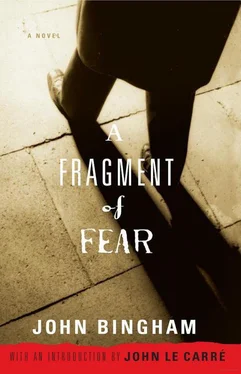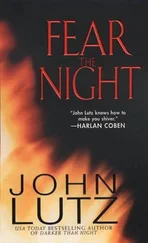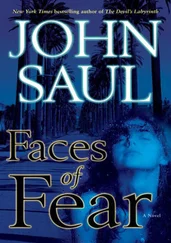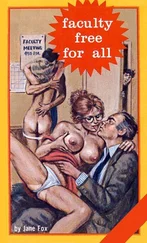John Bingham - A Fragment of Fear
Здесь есть возможность читать онлайн «John Bingham - A Fragment of Fear» весь текст электронной книги совершенно бесплатно (целиком полную версию без сокращений). В некоторых случаях можно слушать аудио, скачать через торрент в формате fb2 и присутствует краткое содержание. Жанр: Триллер, на английском языке. Описание произведения, (предисловие) а так же отзывы посетителей доступны на портале библиотеки ЛибКат.
- Название:A Fragment of Fear
- Автор:
- Жанр:
- Год:неизвестен
- ISBN:нет данных
- Рейтинг книги:3 / 5. Голосов: 1
-
Избранное:Добавить в избранное
- Отзывы:
-
Ваша оценка:
- 60
- 1
- 2
- 3
- 4
- 5
A Fragment of Fear: краткое содержание, описание и аннотация
Предлагаем к чтению аннотацию, описание, краткое содержание или предисловие (зависит от того, что написал сам автор книги «A Fragment of Fear»). Если вы не нашли необходимую информацию о книге — напишите в комментариях, мы постараемся отыскать её.
A Fragment of Fear — читать онлайн бесплатно полную книгу (весь текст) целиком
Ниже представлен текст книги, разбитый по страницам. Система сохранения места последней прочитанной страницы, позволяет с удобством читать онлайн бесплатно книгу «A Fragment of Fear», без необходимости каждый раз заново искать на чём Вы остановились. Поставьте закладку, и сможете в любой момент перейти на страницу, на которой закончили чтение.
Интервал:
Закладка:
“She’s dead, Miss Brett. I understand she had no family left. Who can object?”
She did not reply at once. Then she said:
“I’ve answered many questions already for the police. I’m depressed and tired of it all.”
“I can understand that. Signor Bardoni, manager at the Sorrento hotel, felt the same. When he confirmed this address he said he was sure you would do your best,” I lied.
“Did he indeed?”
She was looking at me with her pale, emotionless eyes. I noticed a slight flush at the lower part of her neck, and how it was spreading slowly up her throat.
“Do you know him?” I asked.
“No, I don’t know him. I met him once, but I don’t know him. A few years ago, after Mrs. Dawson had booked a room at his hotel, and had been unwell, he apparently wrote to her and said that he was coming to England and would be returning to Italy at about the same time as she was going there. He would pick her up here and look after her on the journey, which he did. I just met him briefly.”
“That was kind of him.”
“Yes, it was.” There was no enthusiasm in her voice. “You’re not a private detective, are you?”
“A private detective? Good God, no! Why should I be? Who would employ me, and why, for heaven’s sake?”
“I just wondered.”
“Why should I be a private detective?” I persisted.
She stubbed out her cigarette in the square ashtray, and looked out of the window across the grey Channel.
She was an ugly, ungracious woman, and difficult to talk to. I felt an appalling pity for her, encased and protected as she was by her impenetrable unattractiveness. I could not understand why she had flushed when I mentioned Bardoni, but I knew that nobody, and certainly not a worldly Italian, was likely to have had a brief whirlwind flirtation with her. She did not reply directly to my question.
“You are just an author-well, what do you want to know?”
Before I could pose a question she said:
“Mrs. Dawson was a very remarkable woman.”
“I’m sure she was. How long had she been living here?”
“About seventeen years.”
“Perhaps you could tell me something of her background?”
“It is not my business to inquire into the background of a resident.”
I got up from my chair and walked over to the window. I looked down at the promenade, allowing time for my irritation to die. I wasn’t going to get far with this one.
“What happened to her husband?” I asked perfunctorily.
“He died many years ago. There was some tragedy.”
“What sort of tragedy?”
“I haven’t the faintest idea. It is not for me to pry into personal tragedies.”
“Had she any family left?”
“I don’t think so.”
“Had she any close friends in the hotel?”
She hesitated. I suppose she knew I could find out, anyway. She said:
“Well, there was Mrs. Gray, who came here at about the same time. And Mrs. Dacey, I suppose, because she has been here almost as long, though she keeps herself to herself.”
“Had she any hobbies or eccentricities?”
“Not as far as I know.”
“Is there anything interesting about her at all which you can tell me?”
“Nothing.”
I paused.
“Then why was she a very remarkable woman, Miss Brett?”
I stared at her as I spoke, and saw the pink flush start again in her throat and spread painfully upwards.
“She just was. She was more active than most of our elderly residents.”
“That’s all?”
“Yes, that’s all.”
I thanked her. As I moved towards the door, she said:
“Why ferret about in the past, Mr. Compton?”
She had risen to her feet and stood by her desk, sturdy, ugly, and in some odd way defiant. Once again I felt a wave of pity, as one does sometimes for unlovable or unlikable people. It’s not that one wants to love them or even like them. There are only twenty-four hours in the day. You can’t take them all on.
“It won’t do any good, will it?” she added.
I repeated my earlier reply:
“What harm will it do?”
She walked heavily toward the windows. She was not particularly masculine but she had no feminine appeal. She was a lump of humanity mechanised into the hotel business.
“Delving into the past-what good will it do?” she said helplessly, without looking round.
“What harm?” I said yet again. “I don’t understand-what’s the harm?”
The change from hostility to something akin to a plea had caught me by surprise.
“None, I suppose,” she muttered, and drew her handkerchief out of her cardigan pocket.
With a woman of her type it is difficult to know whether such an action is due to hayfever, catarrh, or tears.
As I closed the door, I could not help thinking of Signor Bardoni’s words, “Let her be, Mr. Compton, let her be!” In his case, the words had been accompanied by a remark about the dead hitting back, a blatant appeal to superstition. Constance Brett’s stumbling appeal had been to the heart.
Both were directed to the same end.
The following is a brief record of my interview with Mrs. (Caroline) Gray, as written on the evening of October 8th:
Interviewed Mrs. (Caroline) Gray this afternoon in hotel garden, on bench. After wet morning, warm and sunny. Dahlias, some tall some dwarf, made fine colour in borders….
Mrs. Gray is a dumpy woman in late sixties. Round podgy face, heavily powdered, muffin-like. Small brown eyes almost hidden by fat cheeks. Small slit for mouth. Lipstick. Sometimes seems to be sucking imaginary sweet in front of mouth. Has odd habit of repeating parts of sentences.
Myself: The manageress tells me you were her closest friend in the hotel.
Mrs. G.: I was, indeed I was. It is a great shock to me, a very great shock. She was a very remarkable woman. I said she was a very remarkable woman.
Myself: Why was she remarkable?
Mrs. G.: She just was. Everybody agreed about that.
What are you writing in that notebook?
Myself: Just a few shorthand notes.
Mrs. G.: Why?
Myself: I have a bad memory.
Mrs. G.: The ways of the Lord are strange.
Myself: I beg your pardon?
Mrs. G.: Her father lost a great deal of money to a crook. Her husband was in the Army. He was killed a couple of years after they were married.
Myself: In what war?
Mrs. G.: In no war. He was killed by a burglar. I said he was killed by a burglar.
Myself: By a burglar?
Mrs. G.: He went down and disturbed a burglar, and was killed. And now this awful tragedy. Strange, the ways of the Lord. Some families seem to attract trouble. I said they seem to attract trouble, some families.
Myself: It sometimes looks like it. Who were these people called the Stepping Stones?
Mrs. G.: What people called the Stepping Stones?
Myself: Well, I don’t know. That’s why I am asking you.
Mrs. G.: I don’t wish to go on talking to you, if you are going to be rude.
(N.B. It was certainly a rude remark. But she had begun to irritate me. She was twittery and nervous, her little currant eyes were fixed on my face to note the impression she was making. Her voice took on a tone like a schoolmistress or a prison wardress. Some of these cosy-looking, muffiny-faced old ladies can be proper Tartars.)
Myself: I apologise, if I sounded rude. I did not mean to.
Mrs. G.: Very well, then. Everybody can be misunderstood. I said everybody can be misunderstood.
Myself: Quite.
(N.B. A fairly long silence. Decided to try again.)
Читать дальшеИнтервал:
Закладка:
Похожие книги на «A Fragment of Fear»
Представляем Вашему вниманию похожие книги на «A Fragment of Fear» списком для выбора. Мы отобрали схожую по названию и смыслу литературу в надежде предоставить читателям больше вариантов отыскать новые, интересные, ещё непрочитанные произведения.
Обсуждение, отзывы о книге «A Fragment of Fear» и просто собственные мнения читателей. Оставьте ваши комментарии, напишите, что Вы думаете о произведении, его смысле или главных героях. Укажите что конкретно понравилось, а что нет, и почему Вы так считаете.












